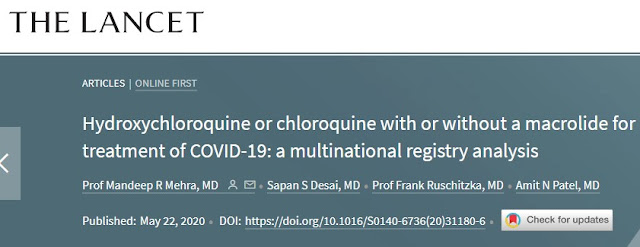COVID-19: HYDROXYCHLOROQUINE EVIDENCE SO FAR.
Almost 8 months have passed since the covid-19 outbreak and our search for the cure is still on. Recent surge in cases in South Asia, over 500 cases in Nepal and more than a lakh in India is troubling. Many of the world's most hit nations are slowly recovering from the first wave but south asia is yet to witness the worst. Although the mortality rate seems to be low in our part of the world,the weak economy, weaker health system and lack of efficient government policy can do even greater damage.
Amid all this we hear about various treatment options everyday. Remdesivir, Favipiravir, Lopinavir-Ritonavir etc,. Among all this hydroxycholoroquine, chloroquine and macrolides have caught tremendous attention. Thanks to President Trump, the magic he did with presdiential campaign the same has been replicated with HCQs.
It is a preprint version of a systemic analysis available at MedRxiv. It is a systematic review and meta-analysis of various studies. The authors had searched PubMed, Embase, the Cochrane Library, Web of Science, medRxiv, and other relevant resources until May 13, 2020. It is not yet peer-reviewed.
ICMR, the Indian Reseaech authority and many other countries have recommended chemoprophylaxis with
hydroxychloroquine (400 mg twice
on day 1, then 400 mg once a week
thereafter) for asymptomatic healthcare workers treating patients with
suspected or confirmed COVID-19, and
for asymptomatic household contacts
of confirmed cases. Howerever, there are no robust clinical data for HCQs for the prophylaxis except its in vitro anti viral activity. This recommendation has lead to panic buying of the drug which has resulted into its short supply. HCQ is a cheap drug which is primarily used in malaria, SLE, and Rheumatoid arthritis. Such panic buying has lead to short supply of the medications for patients with SLE and malaria. HCQs and particularly chloroquine has significant side effects like QTc prolongation, G6PD deficiency related bleeding and rarely Torsades de pointes, the mortality rate of these side effects are higher than covid itself. These recommendations and claims have led to false optimistic perception of these drugs in the public.
Why Hydroxychloroquine?
Chloroquine and its congener, hydroxychloroquine, have shown anti-inflammatory and antiviral effects in vitro, with HCQ exhibiting more potent activity.Hydroxychloroquine exerts its antiviral effect by increasing endosomal pH within the cells.
It also inhibits glycosylation of receptors on the cell surface, which prevents
binding of the SARS-CoV-2 virus to the ACE-II receptor .
This results in blockade of the
entry pathway of the virus into the cell.
French Connection
Since the outbreak there has been hightened interest in the efficacy of HCQ.
In one of the earliest study in Marseilles, France HCQ was found to have good effect on covid patients.
20 confirmed COVID-19 cases received HCQ 600 mg/d; azithromycin was added based on the clinical
situation.
16 patients from another center acted as controls.
By day 3, 50% of
hydroxychloroquine-treated patients tested negative for the virus by RT-PCR compared to
6.3% in the control group; by day 6, 70% among the treated group tested negative compared
to 12.5% in the control group.
PROBLEMS
Outcomes of 6 patients from the treatment group were not
reported in this study.
3 patients had worsening requiring ICU admission,
and one patient died, while treatment was discontinued in two other patients.
RECENT ARTICLES
It was a multinational registry analysis of the use of hydroxychloroquine or chloroquine with or without a
macrolide for treatment of COVID-19.
The registry comprised data from 671 hospitals in six continents.
It included
patients hospitalised between Dec 20, 2019, and April 14, 2020, with a positive laboratory finding for SARS-CoV-2.
Patients who received one of the treatments of interest within 48 h of diagnosis were included in one of four treatment
groups (chloroquine alone, chloroquine with a macrolide, hydroxychloroquine alone, or hydroxychloroquine with a
macrolide), and patients who received none of these treatments formed the control group.
96032 patients (mean age 53·8 years, 46·3% women) with COVID-19 were hospitalised during the study
period and met the inclusion criteria.
14 888 patients were in the treatment groups (1868 received
chloroquine, 3783 received chloroquine with a macrolide, 3016 received hydroxychloroquine, and 6221 received
hydroxychloroquine with a macrolide) and 81 144 patients were in the control group.
Result:This analysis was unable to confirm a benefit of hydroxychloroquine or chloroquine, when used alone or with
a macrolide, on in-hospital outcomes for COVID-19.
Each of these drug regimens was associated with decreased
in-hospital survival and an increased frequency of ventricular arrhythmias when used for treatment of COVID-19.
Among patients hospitalized in metropolitan New York with
COVID-19, treatment with hydroxychloroquine, azithromycin, or both, compared with neither
treatment, was not significantly associated with differences in in-hospital mortality. However,
the interpretation of these findings may be limited by the observational design.
| Source: MedRxiv |
It is a preprint version of a systemic analysis available at MedRxiv. It is a systematic review and meta-analysis of various studies. The authors had searched PubMed, Embase, the Cochrane Library, Web of Science, medRxiv, and other relevant resources until May 13, 2020. It is not yet peer-reviewed.
Symptomatic progression, mortality, viral clearance, the evolution of changes on
chest CT imaging, and adverse events were evaluated.
Result:
11 studies including,3 RCTs and 8 observational studies were included in this anaylsis. Among these, 2354 patients received hydroxychloroquine alone or in
combination, while 1952 did not.
There was no statistically significant difference among HCQ treated and non-HCQ treated patients in terms of mortality, viral clearence and worsening of symptoms.
Only 2 studies showed improvement in CT chest with the use of hydroxychloroquine compared to
standard care (OR: 2.68, CI: 1.1–6.6; P = 0.03). The incidence of adverse events was
significantly higher with hydroxychloroquine.
This study also concluded that HCQs have no beneficial outcome in treatment of covid-19 and was associated with adverse effects.







Comments
Post a Comment